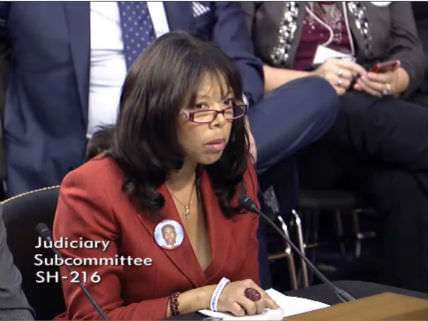Did Florida's 'Stand Your Ground' Law 'Empower' Michael Dunn to Kill Jordan Davis?

Yesterday I explained why attempts to draw a connection between the shooting of Trayvon Martin and Florida's "stand your ground" self-defense law are unpersuasive. That post was prompted by the testimony that Sybrina Fulton, Martin's mother, delivered at a hearing before the Senate Judiciary Committee's Subcommittee on the Constitution, Civil Rights, and Human Rights. But the subcommittee also heard from Lucia McBath, the mother of Jordan Davis, a black teenager who was killed last year in circumstances where a duty to retreat might have made a difference. Michael David Dunn, a middle-aged white man, shot Davis at a Jacksonville gas station after a dispute over loud music. Here is how McBath describes the incident:
My son Jordan was shot and killed last November while sitting in the back seat of a friend's car listening to loud music. The man who killed him opened fire on four unarmed teenagers even as they tried to move out of harm's way. That man was empowered by the Stand Your Ground statute. I am here to tell you there was no ground to stand. There was no threat. No one was trying to invade his home, his vehicle, nor threatened him or his family. There was a vociferous argument about music, during which the accused, Michael Dunn, did not feel he was treated with respect. "You're not going to talk to me like that," he shouted as he sprayed the car that Jordan sat in with bullets, killing him instantly. When Jordan's friends tried to back the car away, Mr. Dunn aimed his handgun and fired off several more rounds; nine, total, pierced the car….
Once he had unloaded his gun at my son and his teen-aged friends, he immediately went back to his hotel, ordered a pizza and slept. He left the scene and made no attempt to call police. He retreated, but only after he killed my son. The next morning he was arrested two hours away. Those are hardly the actions and motives of someone who was quaking with fear.
Dunn, who was charged with second-degree murder but has not been tried yet, claims he feared for his life because he heard threats and saw a shotgun. He says he did not call the cops because he did not think he had hit anyone. Police did not find any weapons at the scene, and according to McBath there were none. But if so, the shooting was clearly unjustified, with or without a duty to retreat. If in fact "there was no threat" and therefore "no ground to stand," as McBath says, the details of Florida's self-defense law would make no difference. Dunn's right to stand his ground would matter only if someone really did brandish a gun, since Dunn arguably could have escaped the danger by leaving the gas station. So if the jury buys Dunn's dubious story, the fact that he was not obligated to run away might make a difference.
McBath's argument that Florida's self-defense law "empowered" Dunn to fire on the car in which her son was riding is less plausible. Assuming Dunn was not responding to a genuine threat, the most likely explanation is that he lost his temper because Davis and his friends disrespected him, as McBath suggests. Assuming that's what happened, it's doubtful that he considered the legal implications at all, but if he did he could not possibly have believed it was all right to shoot at a bunch of teenagers because they refused to turn their music down.
It's worth keeping an eye on this case, because exhibits against the "stand your ground" principle have a way of disintegrating. Not long ago, the Tampa Bay Times was citing the 2010 shooting of 41-year-old David James by his 69-year-old neighbor Trevor Dooley following an argument at a park in Valrico as an example of the unnecessary violence supposedly condoned by Florida's statute. Then a judge rejected Dooley's self-defense claim at a pretrial hearing, and a jury convicted him of manslaughter. He was sentenced to eight years in prison.


Show Comments (14)